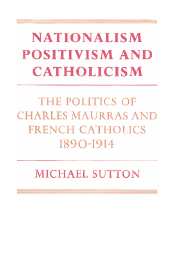 Nationalism, Positivism and Catholicism
Nationalism, Positivism and Catholicism Book contents
- Frontmatter
- Contents
- Dedication
- Acknowledgements
- Introduction
- 1 Maurras's appreciation of Comte
- 2 Individualism, the decline of France, and Maurras's proposed remedy
- 3 The time of the separation of Church and State
- 4 Blondel and Maurras
- 5 Laberthonnière's separation between politics and Christian faith
- 6 Orthodoxy and Rome
- Epilogue
- Notes
- Index
- Cambridge Studies in the History and Theory of Politics
1 - Maurras's appreciation of Comte
Published online by Cambridge University Press: 22 September 2009
- Frontmatter
- Contents
- Dedication
- Acknowledgements
- Introduction
- 1 Maurras's appreciation of Comte
- 2 Individualism, the decline of France, and Maurras's proposed remedy
- 3 The time of the separation of Church and State
- 4 Blondel and Maurras
- 5 Laberthonnière's separation between politics and Christian faith
- 6 Orthodoxy and Rome
- Epilogue
- Notes
- Index
- Cambridge Studies in the History and Theory of Politics
Summary
Ideological politics issuing from the Dreyfus Affair
Although at first only a small and adventitious offshoot of the Dreyfus Affair, the Action Française proved to be a robust and long-lived witness to the passions and ideas that tore French political life asunder at the turn of the century. And this was in large part due to the rôle played by Maurras as consummate political ideologist.
Maurras himself has described a precise starting point. Its occasion was the immediate aftermath of the second Dreyfus court-martial, which took place in Rennes at the end of the summer of 1899, and of which the outcome was a second verdict of guilty mitigated by unexplained extenuating circumstances and a pardon shortly afterwards from the President of the Republic. In the face of this course of events, Maurras's reaction was to seek support for some collective denunciation of two or three court-martial witnesses whom he considered to have given false testimony in favour of the accused. But this enthusiasm to question the Rennes retrial was rebuffed, at a meeting of anti-Dreyfusards, by Jules Quesnay de Beaurepaire (notable in the Affair through his resigning in protest from the presidency of the civil section of the Cour de Cassation at the beginning of 1899) and Maurice Spronck (to be a Deputy of the Seine, elected by the seventh arrondissement of Paris, from 1902 to 1919).
- Type
- Chapter
- Information
- Nationalism, Positivism and CatholicismThe Politics of Charles Maurras and French Catholics 1890–1914, pp. 11 - 45Publisher: Cambridge University PressPrint publication year: 1982
